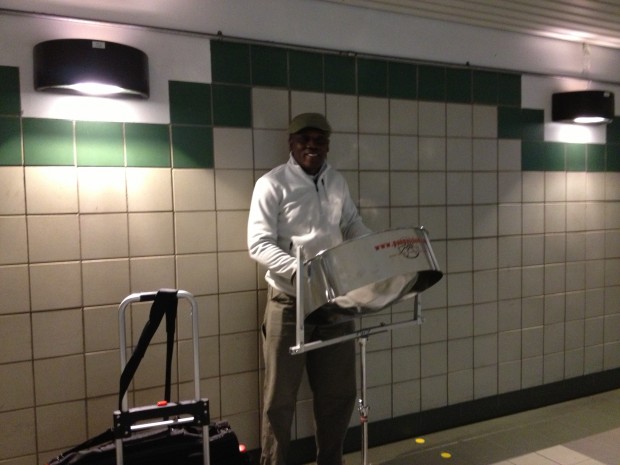


 The Toronto Transit Commission (TTC) has allowed musicians to play in its subway system for almost 35 years. Although the TTC does not pay the musicians money to perform, the idea they were able to get an official license to perform on TTC property is satisfying enough.
The Toronto Transit Commission (TTC) has allowed musicians to play in its subway system for almost 35 years. Although the TTC does not pay the musicians money to perform, the idea they were able to get an official license to perform on TTC property is satisfying enough.
The TTC Subway Musicians Programme began in 1979. According to the TTC website, 74 percent of TTC riders were in favour of having subway music after the program’s first six-month run. Therefore, the TTC officially approved the program in 1980 and the TTC began to hold auditions, which saw about 50 musicians participate on a yearly basis.
Now auditions take place every three years and about 200 musicians tryout for a TTC license making the audition process quite competitive.
“The TTC advertises usually during the time of the CNE (Canadian National Exhibition),” says licensed TTC performer, Lincoln B. “They advertise for auditions which you apply for and then they select basically 100 musicians.”
Lincoln is from Jamaica and plays the steel drums in York Mills station. He’s been a licensed TTC performer since 2011. He says there are two different licenses that musicians can get after they audition.

Lincoln B.
York Mills Station – Licensed TTC performer since 2011. He says there are two different licenses that musicians can get after they audition.
“Actually 75 musicians are given the regular license and they are given a schedule and about 50 other musicians are given an auxiliary license. I don’t remember the number since I’ve never been an auxiliary musician, but auxiliary musicians have special spots.”
Musicians who are awarded a regular license by the TTC have more luxury than the musicians who are given an auxiliary license. Regular licensed musicians are given a three-day schedule, which rotates around 25 stations in Toronto. The type of license a musician gets is determined by the musician’s audition, which adds to the competitiveness of getting into the program.
“I scored very low on my audition so I only obtained the auxiliary license,” says Electric Guitarist, Rob M, who has been a licensed TTC musician for over 10 years.
Rob has been playing in the same spot at Finch station ever since he got his license but because it is an auxiliary license, his spot can easily be taken away from him if someone with a regular license wanted it.
“They are all on schedule and there are 25 spots around the subway system for regular musicians to play, so for us, if there is no one there, its first come first serve. But if a regular licensed guy comes and I’m playing, they have the choice to kick me out because they have the regular license.”
Another musician who has an auxiliary license is Mike G who plays guitar in Sheppard station. He says that the TTC is very difficult to get into as a musician because of the judges who pick the applicants.
“The hardest part is the actual audition because they don’t have the same judges all the time so you might go one year and all three judges might love what you do” Mike said. “Then you go the next time and all three judges, even though you played the exact same thing, just don’t like it.”
The judges range from various areas in the music industry. They can be celebrities, music teachers, agents, or representatives of famous music festivals. Overall they judge a musician based on stage presence, talent, and entertainment value. Therefore to succeed at a TTC audition can be taken as a huge compliment for a musician as well as be a great sign of talent.
For Instance take Roger Ellis, a guitarist who also performs at York Mills station. He’s been a licensed TTC busker since 1997 yet he was in the band, Edward Bear, in the 1970s. His band won multiple Juno awards and had a number one record called ‘Last Song’.
“It brings me a lot of pleasure. I’m lucky to still do it,” Ellis told the Toronto Star, which is probably a notion that he, and other TTC musicians, can share on the subway line.








